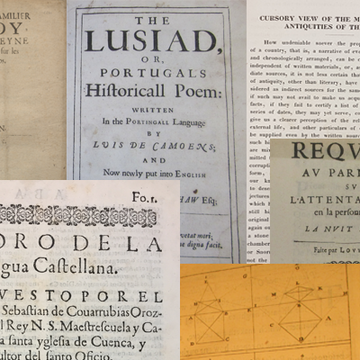Digital Editions Course
Transcription

Participants in this course create their own digital editions of out-of-copyright texts held by the Taylor Institution Library. The completed editions are deposited in ORA-data for long-term preservation and reuse, as well as being published on the Taylor Editions website. For existing examples see: editions.mml.ox.ac.uk.
Why digitise?
It’s fun! Just like sketching can make you notice new things about a landscape (even if you’re not a talented artist!) the act of digitising a text can help you see things you hadn’t noticed before.
Understanding how a digital text is created can give a greater understanding of what can be legitimately interpreted from such texts using digital tools, and may suggest new ways of answering research questions.
An insight into the whole lifecycle of a digital text is very useful preparation for preparing grant applications for larger projects.
The digitised texts, even if not part of a large funded project, will be available for reuse and as such will be a valuable contribution to future research.
What do the sessions involve?
After the introductory session in week one, which gives advice on choosing a text to digitise, there is a weekly short talk on various themes (see programme below) followed by the opportunity to ask questions and receive guidance on projects. Participants should aim to come to at least the first half hour of each session, and allow another hour a week of working in their own time on their projects. 1-to-1 help will be available throughout term for anyone requiring extra assistance.
What these sessions do not cover?
These sessions do not cover the analysis of the digitised text using digital tools, although advice will be available on the types of tools available, and who to contact for further information.
Course Leaders
Emma Huber, Subject Librarian for German, was formerly a text-encoding reviewer for the Early English Books Online Text Creation Partnership (EEBO-TCP), project co-ordinator for the Shakespeare Quartos Archive project and led two work packages for the large European FP7-funded IMPACT (Improving Access to Text) Project, disseminating best practice in digitisation with partner institutions including the Bayerische Staatsbibliothek, the Koninklijke Bibliotheek, the British Library, the Bibliothèque Nationale de France and Biblioteca Nacional de España.
Frank Egerton, Sackler-Taylor Operations Manager, is a member of the TORCH Digital Humanities Steering Group and the Bodleian Research Data Management Group. He is a core course tutor on the MSt in Creative Writing and assessor for Creative Writing on the Certificate of Higher Education programme. In 2016 he was a co-investigator on an Oxford e-Research Centre visual analytics project on textual shape. He is a member of common room at Kellogg College.
Joanne Ferrari, Subject Consultant for Spanish, Portuguese & Latin American literatures and languages, and Subject Team Leader at the Taylor Institution Library has taught information skills classes on a range of topics for the last ten years. She is a member of the Bodleian Libraries E-Books Steering Group as the representative for European languages, and is an Associate Fellow of the Higher Education Academy. She also co-edits the Taylorian blog.
Johanneke Sytsema, Subject Consultant for Linguistics, Dutch and Frisian and Fellow of the Frisian Academy, has a wide experience of transcribing manuscripts. For her PhD she transcribed 15th-17th century manuscripts, and went on to provide digital editions of two Oxford-based Old Frisian and Middle Dutch manuscripts (14th century). She is a member of the Bodleian Libraries SOLO User Group and is Linguistics Lecturer at St Edmund Hall.
Course Outline
All sessions will take place on Wednesdays at 1.30pm in the Graduate Studies Room, off the Gallery of the Main Reading Room. They take 30 minutes, but the course leaders are available for another half an hour after each session for questions and to offer support.
|
Week 1 |
Introduction. Registration and choosing a text. |
|
Week 2 |
DIY Digitisation – images. How to take, describe and share images appropriately. |
|
Week 3 |
Transcription. Editorial decisions and special characters |
|
Week 4 |
Encoding. Introduction to XML and the Text Encoding Initiative (TEI) |
|
Week 5 |
Encoding 2. Navigating the TEI documentation. More advanced editorial encoding. |
|
Week 6 |
Quality Assurance. Tips and tricks for checking your work |
|
Week 7 |
Preservation. Depositing in ORA-data |
|
Week 8 |
Publication and Dissemination |
How to Register
It is only possible to accommodate a limited number of participants on this course. Please do register your interest as soon as possible by emailing emma.huber@bodleian.ox.ac.uk.


